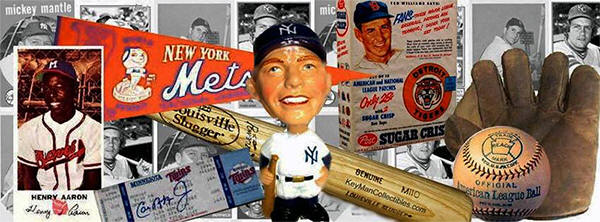|
|
|
|
|
| |
"Base-Ball Ballads" Baseball Poems By Grantland Rice
Featuring "Casey's Revenge" |
|
| |
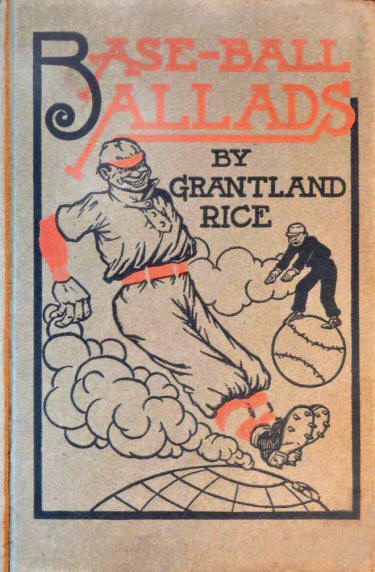 |
|
Base-Ball Ballads By
Grantland Rice |
|
|
Item Details |
-
CIRCA
- 1910
-
PUBLISHER
- The
Tennessean Company,
Nashville, Tenn.
-
SIZE
- 5" x 7.75"
(128 Pages)
-
FORMAT
- Sheet
Music
-
PRICE GUIDE
- $100.00 - $200.00
Good - Very
Good Condition
|
|
|
|
| |
|
|
| |
Grantland Rice was an early
20th-century American sportswriter
whose writing was published in
newspapers around the country and
broadcast on the radio. In 1906 Grantland Rice penned
"Casey's Revenge" a sequel
to "Casey at the Bat, the classic
poem written in 1888 by Ernest Thayer.
Rice’s first book of poems, "Base-Ball
Ballads," was Published by The
Tennessean Company, of Nashville,
Tennessee in 1910. The book with
illustrations By C. H. Wellington,
contains baseball verse exclusively.
It includes some of the best-known poems about baseball ever written,
including "Casey’s Revenge, which
was originally credited to an author
named James Wilson, a pseudonym
Grantland Rice used before
acknowledging the poem as his creation; "Mudville’s
Fate;" and the original version of
"Game Called." In 1948 Rice
revised "Game Called" into a eulogy for
Babe Ruth.
|
|
| |
|
Base-Ball Ballads By
Grantland Rice |
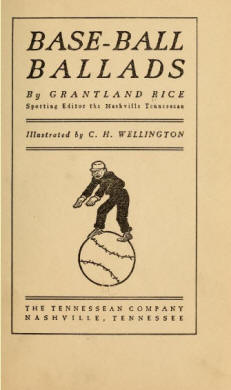 |
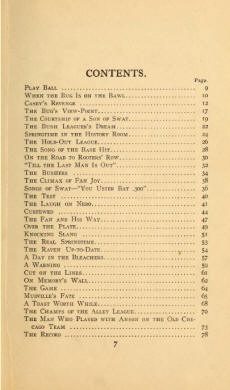 |
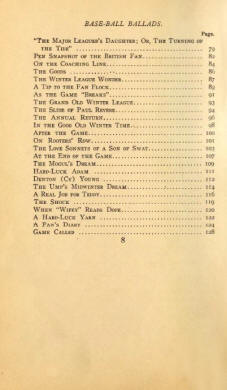 |
| Title Page |
Contents Page 7 |
Contents Page 8 |
|
|
|
|
|
| |
"Casey's Revenge" - Poem Published In 1910
Written by
Grantland Rice |
|
| |
|
|
| |
There were saddened hearts in Mudville for a week or
even more;
There were muttered oaths and curses- every
fan in town was sore.
"Just think," said one, "how soft
it looked with Casey at the bat,
And then to think he'd
go and spring a bush league trick like that!"
All his
past fame was forgotten- he was now a hopeless "shine."
They called him "Strike-Out Casey," from the mayor down
the line;
And as he came to bat each day his bosom
heaved a sigh,
While a look of hopeless fury shone in
mighty Casey's eye.
He pondered in the days gone by
that he had been their king,
That when he strolled up
to the plate they made the welkin ring;
But now his
nerve had vanished, for when he heard them hoot
He
"fanned" or "popped out" daily, like some minor league
recruit.
He soon began to sulk and loaf, his batting
eye went lame;
home runs on the score card now were
chalked against his name;
The fans without exception
gave the manager no peace,
For one and all kept
clamoring for Casey's quick release.
The Mudville squad
began to slump, the team was in the air;
Their playing
went from bad to worse - nobody seemed to care.
"Back
to the woods with Casey!" was the cry from Rooters'
Row.
"Get some one who can hit the ball, and let that
big dub go!"
The lane is long, some one has said, that
never turns again,
Fate, though fickle, often gives
another chance to men;
And Casey smiled; his rugged
face no longer wore a frown-
The pitcher who had
started all the trouble came to town.
All Mudville had
assembled - ten thousand fans had come
To see the
twirler who had put big Casey on the bum;
And when he
stepped into the box, the multitude went wild;
He
doffed his cap in proud disdain, but Casey only smiled.
"Play ball!" the umpire's voice rang out, and then the
game began.
But in that throng of thousands there was
not a single fan
Who thought that Mudville had a
chance, and with the setting sun
Their hopes sank low-
the rival team was leading "four to one."
The last half
of the ninth came round, with no change in the score;
But when the first man up hit safe, the crowd began to
roar;
The din increased, the echo of ten thousand
shouts was heard
When the pitcher hit the second and
gave "four balls" to the third.
Three men on base -
nobody out - three runs to tie the game!
A triple meant
the highest niche in Mudville's hall of fame;
But here
the rally ended and the gloom was deep as night,
When
the fourth one "fouled to catcher" and the fifth "flew
out to right."
A dismal groan in chorus came; a scowl
was on each face
When Casey walked up, bat in hand, and
slowly took his place;
His bloodshot eyes in fury
gleamed, his teeth were clenched in hate;
He gave his
cap a vicious hook and pounded on the plate.
But fame
is fleeting as the wind and glory fades away;
There
were no wild and woolly cheers, no glad acclaim this
day;
They hissed and groaned and hooted as they
clamored: "Strike him out!"
But Casey gave no outward
sign that he had heard this shout.
The pitcher smiled
and cut one loose - across the plate it sped;
Another
hiss, another groan. "Strike one!" the umpire said.
Zip! Like a shot the second curve broke just below the
knee.
"Strike two!" the umpire roared aloud; but Casey
made no plea.
No roasting for the umpire now - his was
an easy lot;
But here the pitcher whirled again- was
that a rifle shot?
A whack, a crack, and out through
the space the leather pellet flew,
A blot against the
distant sky, a speck against the blue.
Above the fence
in center field in rapid whirling flight
The sphere
sailed on - the blot grew dim and then was lost to
sight.
Ten thousand hats were thrown in air, ten
thousand threw a fit,
But no one ever found the ball
that mighty Casey hit.
O, somewhere in this favored
land dark clouds may hide the sun,
And somewhere bands
no longer play and children have no fun!
And somewhere
over blighted lives there hangs a heavy pall,
But Mudville hearts are happy now, for Casey hit the ball.
|
|
| |
|
|
| |
KEYMAN COLLECTIBLES
RELATED RESOURCES |
|
| |
|
|
| |
 |
|
| |
|
|
|
|

